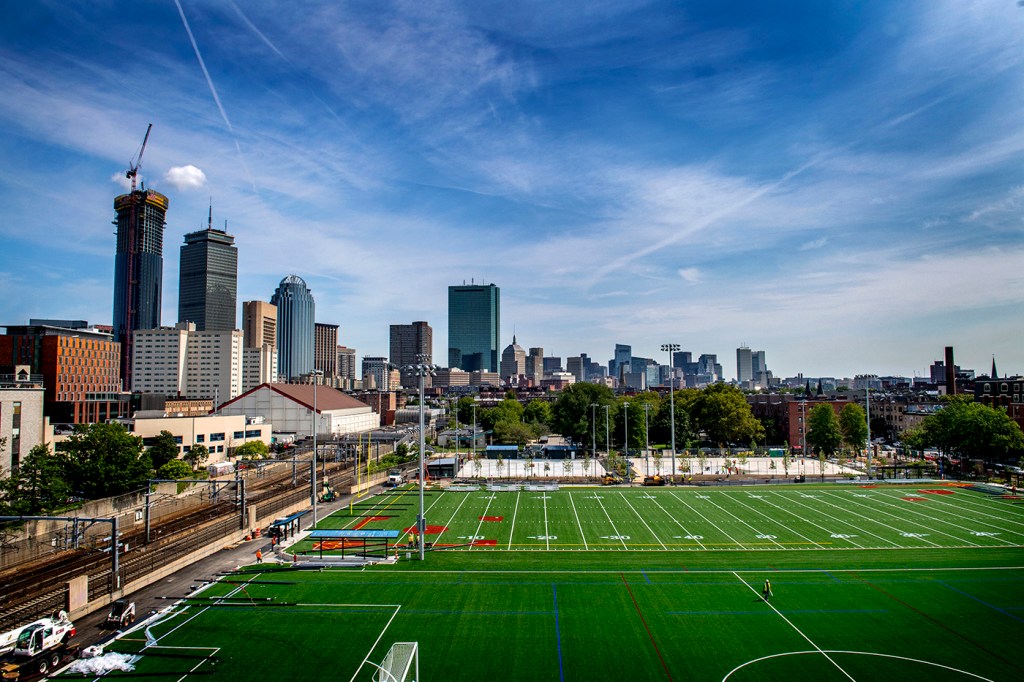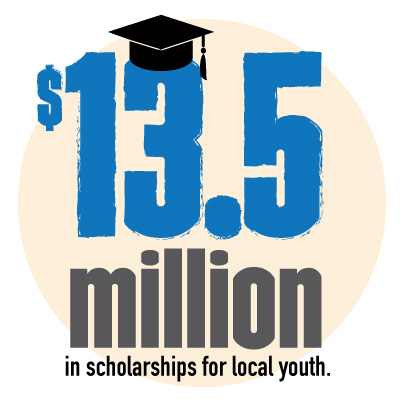Northeastern to open state-of-the-art community park in Boston

A state-of-the-art park will soon open in Boston, providing the city expanded access to modernized playing fields, courts, and recreational equipment on the former grounds of a forlorn city playground.
The transformation of William E. Carter Playground on Columbus Avenue, which is expected to be completed by the end of August, is a joint collaboration between Northeastern and the city of Boston. Through a unique public-private partnership, the new park on Columbus Avenue will include upgraded athletic facilities and expanded opportunities for both city residents and Northeastern students to play sports and have fun.
Northeastern has committed $108 million to the project, $26 million in construction and $82 million in maintenance over 30 years. The university is hosting a ribbon-cutting with Boston Mayor Martin J. Walsh on Sept. 14 to officially mark the park’s reopening.
“This will be a beautiful park, and it’s a shared resource that Northeastern and the community can take advantage of 12 months out of the year,” said Kathy Spiegelman, vice president and chief of campus planning and development at Northeastern. “It’s a public space that belongs to everyone.”

Northeastern increased the park’s size by 25 percent by incorporating its Camden parking lot into the renovation. The park will feature two full football and soccer fields with new playing surfaces that will include two baseball and softball fields—as well as new tennis courts, more open space, and a playground with equipment for children with disabilities. A temporary bubble will cover one of the fields during winter months to allow for year-round use.
The public park—the first in Boston to be named for an African American—is a hub of sports activity in the city’s South End and Roxbury neighborhoods. Not only does it serve as an important space for Northeastern’s club and intramural sports programs, in which nearly 6,000 students annually participate, but it’s also frequently used by numerous community organizations and city programs.
Chip Batchelder, a longtime South End resident and board member of South End youth baseball, said the park’s revitalization is a huge benefit to the community. He said hundreds of youth each year—including his two sons when they were younger—use the field to play baseball throughout spring and summer. “Thank God for Northeastern bringing this park back to reality,” he said.
Batchelder said Northeastern’s investment in the park—and in the Columbus Avenue corridor more broadly—will bring vibrancy to the area and provide much-needed space for youth activities and recreation, particularly in the winter months. “With the activity at the park happening over there morning, afternoon, and night, it’s going to be awesome,” he said.
The park is part of Northeastern’s commitment to making physical improvements at the edges of campus that benefit the neighboring community. In 2015, Northeastern opened Northeastern Crossing on Tremont Street—the university’s first formal venue dedicated to fostering dialogue, creative collaboration, and new connections between city residents and Northeastern students, faculty, and staff. Northeastern Crossing—a division of the university’s Office of City and Community Affairs—provides free resources to Boston-area residents and a range of programming to foster collaboration between the on- and off-campus communities.
Thank God for Northeastern bringing this park back to reality. With the activity at the park happening over there morning, afternoon, and night, it’s going to be awesome.
Chip Batchelder, longtime South End resident
Mayor Walsh said at a topping-off ceremony in February that the new residence hall for Northeastern students on Burke Street, which is slated to open in 2019, would enable more families to live in the Roxbury, Mission Hill, Fenway, and South End neighborhoods, where affordable housing is increasingly scarce. American Campus Communuties, the nation’s largest student housing developer, owns the building, which will add 825 more beds for undergraduates and feature a fitness center, recreational lounges, and 2,200 square feet of street-level retail space.
Longstanding commitment to Boston and neighborhoods surrounding campus
The impending completion of the new Carter Playground comes as the city is scheduled to host a hearing on Thursday to discuss a program that requests voluntary financial payments from nonprofit, tax-exempt organizations based on the tax-exempt property value of those institutions. Over the past year, Northeastern has voluntarily contributed $1.5 million to the city through the Payments in Lieu of Tax, or PILOT, program, as well as an additional $559,000 in property taxes on tax-exempt property.
In addition to Northeastern’s PILOT contributions, the university has demonstrated its longstanding commitment to the city and the neighborhoods surrounding campus in myriad ways.
Each year, Northeastern contributes $13.5 million to provide 150 Boston residents with full scholarships, while also hosting programs that help ready Boston Public Schools students and their families for college.

The university also runs several education programs to help prepare local youth for college. One such program is Foundation Year, a rigorous first-year, full-time college program through which Boston students can prepare for college and receive credit to put toward two- and four-year degree programs. Program applicants from neighborhoods surrounding Northeastern’s Boston campus receive priority in the admissions process. A program for middle and high school students, the Youth Development Initiative Project, supports academic achievement and college success by providing classroom instruction, after-school and weekend tutoring, and mentoring, among other services.
Northeastern students spent more than 280,000 hours working in the community in partnership with local organizations and nonprofits through the university’s Center of Community Service during the 2016-17 academic year—a volunteer effort that contributed an estimated $8 million of in-kind support. Each semester, students also work on co-op as constituent advocates for Boston 311, the city’s 24-hour community hotline. On these co-ops—which Northeastern funds at an annual cost of $258,000—students field inquiries from residents calling to get a pothole fixed, say, or request graffiti removal, while also helping to guide them through snowstorms and blackouts.
Northeastern also supports local businesses and works to strengthen ties between the community and the university. In 2016, Northeastern launched the first university-supported loan program for small businesses owned by women and minorities. The Impact Lending program—to which Northeastern committed $2.5 million in seed funding—enables local entrepreneurs to secure loans, at below-market interest rates, to acquire crucial resources to expand their small businesses.